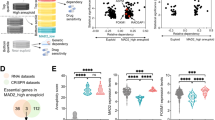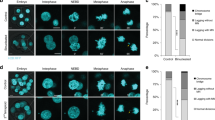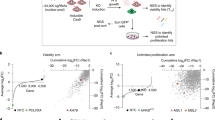Abstract
The mitotic checkpoint protein hsMad2 is required to arrest cells in mitosis when chromosomes are unattached to the mitotic spindle1. The presence of a single, lagging chromosome is sufficient to activate the checkpoint, producing a delay at the metaphase–anaphase transition until the last spindle attachment is made2. Complete loss of the mitotic checkpoint results in embryonic lethality owing to chromosome mis-segregation in various organisms3,4,5,6. Whether partial loss of checkpoint control leads to more subtle rates of chromosome instability compatible with cell viability remains unknown. Here we report that deletion of one MAD2 allele results in a defective mitotic checkpoint in both human cancer cells and murine primary embryonic fibroblasts. Checkpoint-defective cells show premature sister-chromatid separation in the presence of spindle inhibitors and an elevated rate of chromosome mis-segregation events in the absence of these agents. Furthermore, Mad2+/- mice develop lung tumours at high rates after long latencies, implicating defects in the mitotic checkpoint in tumorigenesis.
This is a preview of subscription content, access via your institution
Access options
Subscribe to this journal
Receive 51 print issues and online access
$199.00 per year
only $3.90 per issue
Buy this article
- Purchase on Springer Link
- Instant access to full article PDF
Prices may be subject to local taxes which are calculated during checkout




Similar content being viewed by others
References
Li, Y. & Benezra, R. Identification of a human mitotic checkpoint gene: hsMAD2. Science 274, 246 –248 (1996).
Rieder, C. L., Cole, R. W., Khodjakov, A. & Sluder, G. The checkpoint delaying anaphase in response to chromosome monoorientation is mediated by an inhibitory signal produced by unattached kinetochores. J. Cell Biol. 130, 941–948 (1995).
Basu, J. et al. Mutations in the essential spindle checkpoint gene bub1 cause chromosome missegregation and fail to block apoptosis in Drosophila. J. Cell Biol. 146, 13–28 (1999).
Kitagawa, R. & Rose, A. M. Components of the spindle-assembly checkpoint are essential in Caenorhabditis elegans. Nature Cell Biol. 1, 514–521 ( 1999).
Dobles, M., Liberal, V., Scott, M., Benezra, R. & Sorger, P. Chromosome missegregation and apoptosis in mice lacking the mitotic checkpoint protein Mad2. Cell 101, 635–645 (2000).
Kalitsis, P., Earle, E., Fowler, K. J. & Choo, K. H. Bub3 gene disruption in mice reveals essential mitotic spindle checkpoint function during early embryogenesis. Genes Dev. 14, 2277– 2282 (2000).
Lengauer, C., Kinzler, K. W. & Vogelstein, B. Genetic instabilities in human cancers. Nature 396, 643–649 ( 1998).
DeVita, V., Hellman, S. & Rosenberg, S. (eds) Cancer—Principles and Practice (Lipincott-Raven, New York, 1997).
Cahill, D. P. et al. Mutations of mitotic checkpoint genes in human cancers. Nature 392, 300–303 ( 1998).
Lengauer, C., Kinzler, K. W. & Vogelstein, B. Genetic instability in colorectal cancers. Nature 386, 623–627 ( 1997).
Waldman, T., Lengauer, C., Kinzler, K. W. & Vogelstein, B. Uncoupling of S phase and mitosis induced by anticancer agents in cells lacking p21. Nature 381, 713–716 (1996).
Li, Y., Gorbea, C., Mahaffey, D., Rechsteiner, M. & Benezra, R. MAD2 associates with the cyclosome/anaphase-promoting complex and inhibits its activity. Proc. Natl Acad. Sci. USA 94, 12431–12436 (1997).
Fang, G., Yu, H. & Kirschner, M. W. The checkpoint protein MAD2 and the mitotic regulator CDC20 form a ternary complex with the anaphase-promoting complex to control anaphase initiation. Genes Dev. 12, 1871 –1883 (1998).
Wassmann, K. & Benezra, R. Mad2 transiently associates with an APC/p55Cdc complex during mitosis. Proc. Natl Acad. Sci. USA 95, 11193–11198 ( 1998).
Zou, H., McGarry, T. J., Bernal, T. & Kirschner, M. W. Identification of a vertebrate sister-chromatid separation inhibitor involved in transformation and tumorigenesis. Science 285, 418–422 (1999).
Alexandru, G., Zachariae, W., Schleiffer, A. & Nasmyth, K. Sister chromatid separation and chromosome re-duplication are regulated by different mechanisms in response to spindle damage. EMBO J. 18, 2707–2721 (1999).
Rudner, A. D. & Murray, A. W. The spindle assembly checkpoint. Curr. Opin. Cell Biol. 8, 773– 780 (1996).
Rudner, A. D., Hardwick, K. G. & Murray, A. W. Cdc28 activates exit from mitosis in budding yeast. J. Cell Biol. 149, 1361– 1376 (2000).
Minshull, J. et al. Protein phosphatase 2A regulates MPF activity and sister chromatid cohesion in budding yeast. Curr. Biol. 6, 1609–1620 (1996).
Tuveson, D. A. & Jacks, T. Modeling human lung cancer in mice: similarities and shortcomings. Oncogene 18, 5318–5324 (1999).
Zhou, H. et al. Tumour amplified kinase STK15/BTAK induces centrosome amplification, aneuploidy and transformation. Nature Genet. 20, 189–193 (1998).
Spruck, C. H., Won, K. A. & Reed, S. I. Deregulated cyclin E induces chromosome instability. Nature 401, 297–300 (1999).
Takahashi, T. et al. Identification of frequent impairment of the mitotic checkpoint and molecular analysis of the mitotic checkpoint genes, hsMAD2 and p55CDC, in human lung cancers. Oncogene 18, 4295 –4300 (1999).
Cahill, D. P. et al. Characterization of MAD2B and other mitotic spindle checkpoint genes. Genomics 58, 181– 187 (1999).
Krishnan, R. et al. Map location and gene structure of the Homo sapiens mitotic arrest deficient 2 (MAD2L1) gene at 4q27. Genomics 49, 475–478 (1998).
Rashid, A. et al. Genetic alterations in hepatocellular carcinomas: association between loss of chromosome 4q and p53 gene mutations. Br. J. Cancer 80, 59–66 ( 1999).
Dohner, H., Bloomfield, C. D., Frizzera, G., Frestedt, J. & Arthur, D. C. Recurring chromosome abnormalities in Hodgkin's disease. Genes Chromosom. Cancer 5, 392–398 (1992).
Shivapurkar, N. et al. Multiple regions of chromosome 4 demonstrating allelic losses in breast carcinomas. Cancer Res. 59, 3576 –3580 (1999).
Verma, R. & Babu, A. Human Chromosomes: Principles and Techniques (McGraw Hill, New York, 1995).
Acknowledgements
We thank M. Kirschner for the anti-securin antibody. A.C. performed all cytogenetic and FISH experiments. This work was supported by an NRSA-NIH grant (L.M.); PRAXISXXI, Portugal (V.L.); International Union Against Cancer (ACS-IFB) Fellowship (A.C.); and grants from the NIH (R.B., B.P., P.K.S. and V.V.V.S.M.). We also thank A. Hata and G. Farmer for technical advice, and H. Thaler for statistical analysis.
Author information
Authors and Affiliations
Corresponding author
Supplementary information
Rights and permissions
About this article
Cite this article
Michel, L., Liberal, V., Chatterjee, A. et al. MAD2 haplo-insufficiency causes premature anaphase and chromosome instability in mammalian cells. Nature 409, 355–359 (2001). https://doi.org/10.1038/35053094
Received:
Accepted:
Issue Date:
DOI: https://doi.org/10.1038/35053094
This article is cited by
-
Modeling specific aneuploidies: from karyotype manipulations to biological insights
Chromosome Research (2023)
-
Mitotic phosphorylation of tumor suppressor DAB2IP maintains spindle assembly checkpoint and chromosomal stability through activating PLK1-Mps1 signal pathway and stabilizing mitotic checkpoint complex
Oncogene (2022)
-
Acute systemic loss of Mad2 leads to intestinal atrophy in adult mice
Scientific Reports (2021)
-
Aneuploidy as a promoter and suppressor of malignant growth
Nature Reviews Cancer (2021)
-
The p53/p73 - p21CIP1 tumor suppressor axis guards against chromosomal instability by restraining CDK1 in human cancer cells
Oncogene (2021)
Comments
By submitting a comment you agree to abide by our Terms and Community Guidelines. If you find something abusive or that does not comply with our terms or guidelines please flag it as inappropriate.



